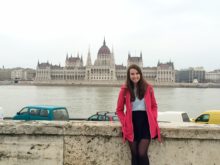As our Class of 2020 prepares to leave the CERES nest, we asked one of this year’s graduates, Tess Megginson, to spare a few moments to chat about her time at the Munk School and what lies ahead.
Hi, Tess! So, tell us more about your post-CERES plans.
This August, I will begin my PhD in history at the University of North Carolina at Chapel Hill. I plan to examine the history of mapping in central and eastern Europe in the 20th century, looking specifically at a spatial history of those populations which were typically absent from state-sanctioned maps. I hope to research how these populations engaged with and mapped their space and place, even as those in power silenced their presence on state maps.
How did you become interested in this topic? Did you study history before coming to CERES?
I am originally from Ottawa, where I grew up two blocks away from a map store that sparked my fascination with maps. I completed my BA at McGill University, majoring in Honours History with a minor in World Islamic and Middle East Studies. I have known I wanted to study history since I was very young, but I fell in love with central and eastern European history in my first year at McGill. In my last year at McGill, I discovered I could combine my childhood love of maps with my interest in history, and I have been doing so ever since.
CERES: where childhood dreams come true! So, you worked on a related topic for your MA here?
My PhD work will expand on my master’s research paper (MRP) at CERES that was supervised by Dr. Julie MacArthur, where I focused on mapping Europe’s borderlands following the First World War.
What examples or case studies did you examine in your work?
I looked at how violence, sovereignty, and mapping all interacted to create a borderland space, using the Polish and Czechoslovak conflict over the city of Teschen/Cieszyn/Těšín from 1918 to 1920 as a case study. While researching this project, I became curious about alternative mapping practices outside of professional cartography, which inspired my proposed research for my PhD.
The CERES MA program has a mandatory international component that requires candidates to spend considerable time in the area that they are studying. Did you use this time to support your MRP work?
I completed a summer internship at the Herder Institute for Historical Research on East Central Europe in Germany, which allowed me to conduct a bulk of my archival research for this project. I also improved my digital mapping and German-language skills. I was able to visit Český Těšín and Cieszyn as part of my Czech-language summer course immediately following the internship, which improved my knowledge of the place I was researching.
It sounds like you made the most of your time in Europe. Now that you are departing the hallowed halls of the Munk School, do you feel the CERES MA program prepared you to make your next step? What aspects of life at CERES have benefited you most?
I am leaving CERES more confident in my language, research, and writing skills. I took Czech language courses both years and a German reading course in my second, which has set me up to conduct fascinating archival research during my PhD studies. CERES also helped me improve my teamwork and leadership skills through the Eurasiatique Graduate Student Journal (I served as a copy editor in my first year and then editor-in-chief in my second) and through student government. I was the First-Year Representative and then the Co-President of the CERES Graduate Student Union. As Co-President, I helped organize the 2020 CERES Graduate Student Conference, which allowed me to connect with other graduate students around the world and showcase their work.
Have you slept in the last two years? Those are quite some accomplishments! Any final thoughts as you move on to your next challenges?
My time at CERES has given me the confidence and skills I will need going into my PhD, and I am very grateful for the time I got to spend here. While I am excited for my next step, I will miss everyone at CERES, from the professors to the staff to all the friends I made.
We’ll miss you too!
